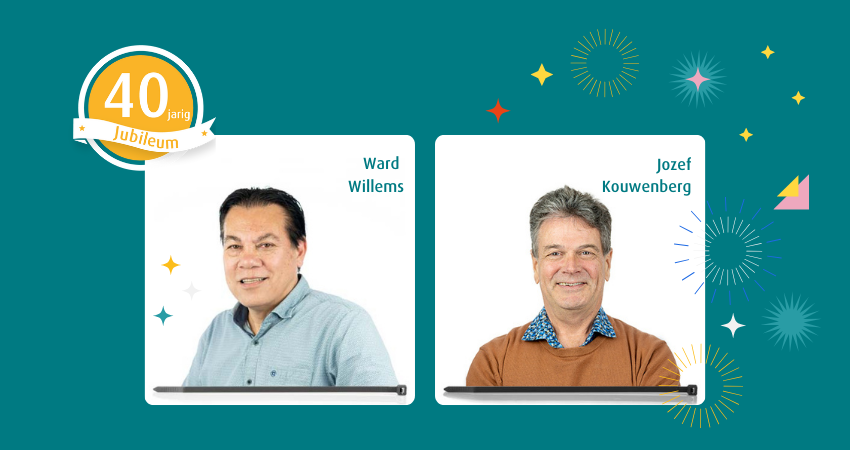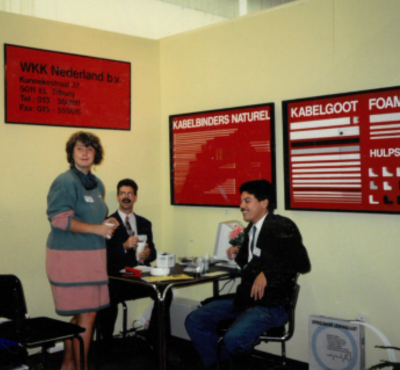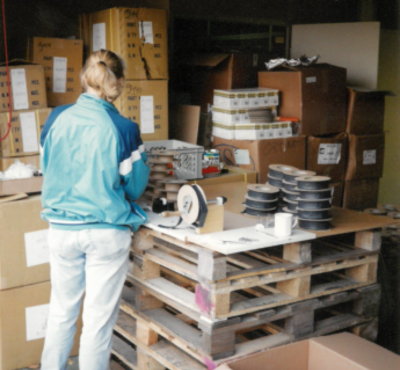How WKK started and grew into the company it is now

Posted on 31 October 2024
Who could have imagined it 40 years ago? What began with selling a batch of cable ties worth 1,000 guilders has grown into a major player in the European market with 5 locations and more than 100 colleagues. If you asked Ward and Jozef, this is exactly what they envisioned. Roxanne, Marketing Mananger of WKK, sits down with them for a conversation.
Roxanne: Forty years of WKK, what a milestone! How does that make you feel?
Jozef: This 40 year anniversary makes me very proud, i feel like we’ve done a damn good job. Yes, it’s that simple.
Ward: There’s a quote from Jozef right there.
Roxanne: And what does that mean? That you’ve ‘done well’?
Jozef: Well, for one, we’ve worked side by side for 40 years without having any big fights. That says a lot about our partnership and shared vision. And the dreams I had when we started—they’ve largely come true.
Roxanne: What were those dreams?
Ward: To be our own boss. To make our own decisions, choose the risks we’re willing and unwilling to take, and always with the goal of growing the company and becoming more prosperous. For the first thirty years, we focused on investing in the company, but in the last five or ten years, we’ve also started enjoying it a bit more.
Roxanne: Why did you want to go into business together and not with someone else you knew?
Jozef: Simply put, I didn’t have a job, and I wanted to see what I could do on my own. I talked about it with Ward, and he definitely had some ideas—he was, and is, a smart guy. He wanted to start a business, but he couldn’t at that time because he had a full-time job. We immediately complemented each other. I’m more of the 'let’s do it right now' type, while Ward would sometimes say, ‘Hold on, that’s not the way to do it.’ I needed that, and he needed hands to do the work.
Ward: We’ve known each other from when we were about 15 or 16 years old. Real childhood friends. Jozef initially wanted to start a business renting garage lifts. But after doing the math, he knew it wouldn’t work out. So, you shouldn’t do it—it’s just not feasible. I had the idea of starting a mobile video rental service.
Roxanne: So you were already thinking about entrepreneurship? Even before these discussions with Jozef?
Ward: Yes, indeed. Jozef abandoned his plans for the garage, and we started with Videocar. The ambition to start a business has always been there. One of us was more of a thinker, and the other was a doer. That’s why our roles were naturally divided from the start. For us, one plus one was really three—we were just very strong together. This became especially clear when we started selling fixation materials and founded WKK in 1984.
Roxanne: Did you have a role model? An entrepreneur you wanted to be like in 20, 30, or 40 years?
Jozef: Well, there weren’t many role models. We especially wanted to explore uncharted territory.
Ward: Exactly, we wanted to forge our own path. When we started, computers were coming onto the scene. So everyone thought, ‘You’re starting a business? You must be going into computers.’ I had some conversations about profit margins, but you need so much expertise, and the returns weren’t worth it. I wanted to commit to something, but it also needed to yield results quickly.
Jozef: So when we started selling cable ties, we looked at how it was done at the time. A salesperson would get in the car and make stops here and there. So we thought, ‘That’s what we shouldn’t do, because everyone’s already doing it.’
Roxanne: So you decided to take a different approach by selling over the phone.
Ward: Well, we started with video tapes. There were video stores, but what was missing? A mobile video store that delivered tapes to people’s homes. At night, we would sit at the kitchen table, shaping our dreams.
Roxanne: When you look back at the start of WKK as it is now, what comes to mind?
Ward: That we immediately saw huge potential in selling cable ties. We created a price list, made copies, and sent them to companies we found in the Yellow Pages.
Roxanne: So this was before you hired anyone?
Ward: Yes, indeed. It was just us and the batch of cable ties we had bought for 1,000 guilders. Within a few weeks, we had sold them all cash on delivery. So we turned 1,000 guilders into 2,000. We still did video tapes, but we saw the potential in cable ties, so we thought, let’s buy 10,000 guilders worth. We made that purchase, and yes, it sold like hotcakes again.
Jozef: I did a little market research myself. I requested a few quotes, and then we had the average price.
Ward: Jeffrey (Willems, Ward’s brother) actually became our first sales manager. He was already working with us on Videocar. And that’s how we grew into the company WKK is today.
Roxanne: Looking back, what were some important decisions in WKK’s development?
Jozef: At the beginning, it was certainly the ladies on the sales team. Other companies only worked with reps who carried products in their trunks, while we could reach far more companies over the phone thanks to a skilled and friendly saleswoman. (For an interview with the first saleswomen, see <link interview>.)
Ward: Another crucial decision was establishing a middle management team at WKK when we were (just) forty years old. Some companies have a boss who does everything, but we decided to delegate. We brought in department heads for the warehouse, accounting, and sales. And with Gerald’s arrival as General Manager about 17 years ago, we could step back from day-to-day operations and focus more on WKK’s growth and development as a whole.
Jozef: We hired a consultant who said, ‘Look at that big pile of stones you have. You take the big ones, and leave the rest to your team.’
Ward: We were open to consultants, but later, some of them told me they learned more from us than we did from them.
Roxanne: What made WKK special?
Ward: We were proactive. The way we approached customers—we didn’t wait around. No, we called people. Back then, that was new.
Jozef: We also taught the team to ask good follow-up questions and be alert to buying signals. Let the customer finish, but then return to that signal you picked up on. Then, close the sale. ‘When do you want to receive the products? Do you prefer five bags or a whole box?’ That’s how we operated.
Roxanne: So one of the key decisions was hiring middle management. What did you spend your time on after that?
Ward: On innovations and developments. In 7 years WKK we reached our first million guilders in turnover. I was still working part-time at WKK, and then Jozef said, ‘If you’re not coming over now, you don’t need to come at all.’ So I quit my job at Jacques Van Ham and committed fully to WKK.
It also turned out to be a good choice not to say ‘yes’ to every client right away. In those early years, we turned down some big orders; otherwise, the stock would be gone, and we’d have to wait three months for a new shipment. Sure, you could take a gamble and sell a million cable ties once, but then you’d have nothing left to sell.
Jozef: You can’t buy if you don’t have the money. You have a limited budget, and you have to make it work. I had a big client that I turned down for two years. But I kept calling him four or five times in those two years. I kept him warm, but he still couldn’t buy.
Roxanne: Did he eventually become a client?
Jozef: Yes, he eventually became one of our biggest clients. He appreciated being treated by a company that knew its own limits. That builds trust.
Ward: We wanted to grow, but in a healthy way—not by taking on a lot of debt. We also started paying in certain installments. You pay for the container first, and then it ships. At one point, we got a 30-day LC, so the amount was deducted after 30 days, and we had to sell as much as possible within that time. But eventually, this didn’t work as well for us, so we traveled to those suppliers in China. Then we received credit terms, with payment periods of 30 days, 60 days, 90 days, even up to 105 days; that was the maximum. This meant our financing was perfect. Goods arrived, sat in inventory for a few weeks, sold, and had to be paid for within 30 days, before we had to pay the supplier. So, our growth cycle was complete!
Roxanne: You also try to finance everything yourselves, like all the business premises. Was this a key part of WKK’s growth?
Jozef: Absolutely. It allowed us to keep the banks out of our business.
Ward: We didn’t have to answer to anyone. So, if we had plans, we just started on them. We had an idea, we pursued it, and we did all the financing ourselves.
Roxanne: Are there things you regret? Or times when you feel you missed an opportunity?
Jozef: Well, there might have been a few opportunities, but then we would have had to take on too much risk.
Roxanne: So that doesn’t suit you—taking on a lot of risk?
Jozef: Is that missing out? In my view, it’s not missing out but avoiding risks. We always believed that 7 or 8 out of 10 decisions had to be right.
Ward: We like to stay in control. We don’t lease, for example. We’ve also ignored some advice. For instance, someone once advised us to restructure the organization and let certain roles go. We didn’t do that. Ultimately, it may have been a longer path to growth, but it’s what we believed in.
Roxanne: That loyalty and focus on relationships—isn’t that typical of WKK and you two?
Ward: Yes, absolutely. We’re an organization that values everyone, and I think that’s contributed to our success. People are willing to put in extra effort for a good result.
Jozef: We believe it’s important that people are happy, that we’re happy, and that we all want to run a good company. Over the years, you do notice that people feel less connected to WKK than at the beginning.
Ward: Back then, we were right there among the people ourselves. We had warehouses, sales departments; we were everywhere. And yes, that sense of closeness has decreased over the years. But that’s natural when you have such a large group. Not everyone enjoys working for a family business. Often, those employees stayed only a few years.
Roxanne: That family feeling—where else does it show up?
Jozef: It shows in that first group of people, especially the first thirty. They feel incredibly comfortable at WKK. If you start a new business now, it’s a different way of doing things and a different kind of loyalty to your employer. Where else do you see people who’ve been with you for 30 years?
Ward: Society has changed. The things we mention used to be more common. Nowadays, it’s more individualistic. Nothing wrong with that.
Roxanne: What other changes have you noticed in the past 40 years?
Ward: You need more transitions to stay up-to-date, and it’s happening faster. We come from the era of the telex, so we saw the fax come in, then emails, and yes, the first computers too. And I think that sales methods are changing; the supply chain is getting shorter. The line between producer and user is shrinking, so anything artificially placed in between will disappear. You also see well-known names disappear because they caught onto trends too late. But we still want to stick to our philosophy—not to follow, but to set trends. It remains a challenge.
Roxanne: Do you see concrete possibilities for WKK there?
Ward: I have some paths in mind. The ultimate goal is that when a customer needs cable ties, clips, or heat shrink tubing, it’s delivered yesterday—before they’ve even asked for it. Truly unburdening the customer. For that, you need artificial intelligence if used smartly. I can picture it. Train your AI robot with enough data on what’s happening. If it rains, more umbrellas are sold, just as an example. The same applies to cable ties. If development X requires more cable ties, they’re more used in construction, for instance. But that’s a project with many layers. Still, I think whoever figures that out will be the market leader.
Roxanne: What do you see for yourselves in the coming years?
Jozef: Our future is essentially what we’re doing now: keeping things together and traveling a lot. Continuing to meet with suppliers—we’re still often the face of WKK.
Ward: We keep a finger on the pulse, but we want to pass it on to the next generation. The goal is still to ensure the company remains successful for at least another 15 or 20 years. Companies don’t live forever; they go through a lifecycle of baby, adolescent, adulthood, and then an older phase.
Roxanne: Where does WKK fall in that cycle now?
Ward: It’s in its mature stage.
Roxanne: Like a 40-year-old?
Ward: Yes, I think so. We think we’re fully developed, but we’re not. There are still so many areas for improvement. We’re always learning. Quality management, for example—it’s not just about getting a certificate; it’s about actually improving processes. Making fewer mistakes, working more efficiently, and so on. And as long as we’re able, I want to stay connected to the company. Besides the fact that it’s our ‘baby’ and we’ve seen it grow to where it is today, it’s also great to be encouraged and challenged to keep moving forward. It keeps you young.
Roxanne: How do you feel about your son and daughter working at WKK?
Ward: The most important thing, as I often say, is that my children are happy and stay that way. My role as a parent is to support that. But it’s also nice to have two of my three children in the company. They’re the people you can trust a hundred percent. They don’t play politics and have a vested interest in the company’s success.
Roxanne: Finally, if someone wants to start a business now, what advice would you give?
Jozef: If you’re starting a business now, look at the latest trends, see how people are doing things, and figure out how you can do it differently. Because everything else has already been done.
Ward: Exactly, you don’t need to repeat what’s already been done. If someone is going to start a new business, they have to do something that doesn’t already exist—with all the risks that come with it. If you really want a chance to stand out, you need passion for entrepreneurship. Just like Jozef and I have.
 |
 |









